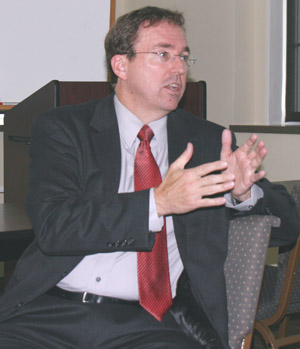By Anne Marie Amacher

DAVENPORT – Since the 1970s, the U.S. bishops have issued a document on political activity during election year, said Tom Chapman, executive director of the Iowa Catholic Conference. “They do so as a member of the body of Christ,” he told his audience attending a June 11 talk on Faithful Citizenship. Some people participated in the presentation on site at Diocese of Davenport headquarters. Others participated over the Internet via GoToMeeting. And some people later watched a DVD of the presentation that was recorded for parishes.
Chapman’s overview of the Faithful Citizenship document included Do’s and Don’ts for parishes. He also talked about the U.S. Department of Health and Human Services mandate, which would require most religious employers to provide no-cost contraceptive coverage even if it is contrary to their beliefs.
He noted that this year’s Faithful Citizenship document is the same as four years ago, except for the introduction. The document from the U.S. Conference of Catholic Bishops (USCCB) seeks to “help Catholics form their conscience in accordance with the truth, so they can make sound moral choices in addressing these challenges (immigration, human dignity, war, terrorism, threats to Catholic ministries, among other issues). We do not tell Catholics how to vote. The responsibility to make political choices rests with each person and his or her properly formed conscience.”
The Church has an obligation to teach about moral values that shape Catholics’ lives, including their public lives that are central to the mission given to them by Christ, Chapman explained. Resources that assist with conscience formation include Scripture, Catechism of the Catholic Church, the compendium and documents from Vatican II, he added. Visit the USCCB website at www.faithfulcitizenship.org or www.usccb.org/
conscience for additional resources in English and Spanish.
He noted that only 3 percent of Catholics surveyed had read Faithful Citizenship in the 2008 election. Only 17 percent of respondents had even heard of Faithful Citizenship. “We need to get the word out there.”
Chapman said Catholics are called to vote, engage in charity, to serve as advocates and do justice work. The Catholic Church ranks high in standing up for the poor, he noted.
He encouraged Iowans to contact their legislators and to attend town hall meetings to express their views and concerns. But their parishes cannot support or oppose candidates, he emphasized, because parishes would risk the loss of tax-exempt status by doing so. That means, for instance, that the parish would have to pay taxes and parishioners could not receive a deduction for their paid contributions to the parish.
Parishes, however, can hold voter registration drives and prayer services for discernment before an election, offer an unbiased forum or debate, or talk about Faithful Citizenship. In a nutshell, Chapman said Faithful Citizenship provides a moral framework. It does not serve as a voter guide or score card.
“Be reluctant to put voter guides out, even from other groups. They are usually biased.” He noted that the Iowa Catholic Conference no longer issues voters’ guides because of spotty and sometimes less than honest responses from candidates.
On the health care debate, Chapman said the U.S. bishops have consistently supported health care for all since 1919. Pope John XXIII also addressed health care as a right in his encyclical “Pacem in Terris,” and the bishops supported health care reform attempts in the 1990s by then-President Bill Clinton.
Since 2009, the U.S. bishops’ priority has been access to affordable health care for all in pursuit of the common good, Chapman said.
The latest health care reform law fails to include a conscience clause. “Every other piece (of federal legislation) has had a clause in it,” Chapman said. The U.S. bishops’ opposition to the contraceptives mandate in the health care law is “about protecting our religious liberty.”
Bishop Martin Amos, who attended the presentation, pointed out other issues involving the right to religious freedom. These include Catholic organizations dropping adoption services because of a requirement that they serve heterosexual and same-sex couples, and the USCCB being denied a federal grant to prevent human trafficking because the grantee does not refer women for abortions. “The bishops conference was the highest-rated group for helping trafficking victims,” Chapman noted.
He encouraged people to pray for the bishops in their efforts to achieve religious liberty.







